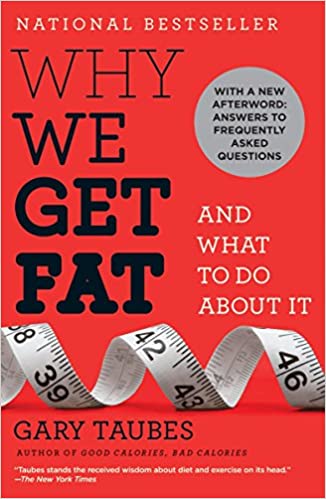Why We Get Fat — Book Summary
Introduction
The book "Why We Get Fat: And What to Do About It" challenges the biological myths that surround obesity and weight gain. Author Gary Taubes takes us to an introductory course about metabolic functions and fat regulations, backed-up with almost a century of published medical literature and scientific studies. He also explores the historical, cultural, and societal motives behind obesity, and connects it to the larger context of weight gain presently. He then debunks the "calorie-in/calorie-out" mindset and discusses how it has actually contributed to the obesity epidemic in the past years.
By the end of the book, the author introduces a long-term and more efficient solution to maintaining a healthy weight through an easy-to-follow, low-carbohydrate diet.
This is not a diet book; it's a biology book that helps us see weight loss in a new light.
The book "Why We Get Fat: And What to Do About It" debunks the widely-accepted and oversimplified "calories-in, calories-out" model of weight loss that we've embraced for years and years. It instead redirects the fault to the insulin in our blood, discussing the effects of a high-carbohydrate diet in our weight gain. And this is just a tip of the iceberg! Packed with comprehensive medical literature and studies, this book is worth reading to the last page.
Interesting quotes from the book
We don’t get fat because we overeat; we overeat because we’re getting fat.
— Gary Taubes, Why We Get Fat
Any diet can be made healthy or at least healthier — from vegan to meat-heavy — if the high-glycemic-index carbohydrates and sugars are removed, or reduced significantly.
— Gary Taubes, Why We Get Fat
The simple answer as to why we get fat is that carbohydrates make us so; protein and fat do not.
— Gary Taubes, Why We Get Fat
Summary of the book Why We Get Fat
The "calories-in/calories out" was never up to debate.
It's an undisputed fact that the reason why we get fat is that we eat too much and/or move too little. As this belief system posits, if we cut-down our calorie intake and exercise regularly, our bodies will stay lean. We see this everywhere. From diet books to TV commercials, health organizations' health pyramids, and government agencies' advisories. We've been so accustomed to this Western way of losing weight, yet in recent years, obesity has still surged dramatically in these countries.
In Why We Get Fat: And What to Do About It, author Gary Taubes takes all our preconceived notions about weight loss, diabetes, and obesity, then turns it on its head. But Taubes doesn't just abandon us clueless; he later introduces to us a new view on weight loss, which will inevitably make us skeptical at first, but eventually lures us in with his highly empirical and well-reasoned basis.
The book is divided into two parts — Biology, not Physics and Adiposity 101. The first half criticizes the conventional wisdom presupposed about gaining and losing weight. The other half delves in more deeply on the intricacies of its science, discussing the thermodynamics, endocrinology, and biochemistry behind metabolic processes.
Don't get overwhelmed yet with this technical jargon! Taubes walks us through these conundrums step-by-step, in a very dummy-friendly manner.
First, Taubes introduces the intriguing coexistence of obesity with malnutrition among poor communities. These are people who live off government-prescribed, low-calorie, and scarce diets, doing physical labor relentlessly. Taubes asks if they were neither overeating nor sedentary, why were they still fat? This poses a challenge to our assumptions about the cause of obesity and weight gain, which Taubes will further enlighten us on the incoming chapters.
He then tackles the infamous and crowd-favorite of slimming down methods: undereating. While Taubes acknowledges that slashing down food intake trims down weight off of us, he also cautions that it is only temporary. Eventually, our bodies will regain the weight and energy. Thus, it's not a viable cure for obesity nor overweight.
Just when you think he's already pushed the limits, Taubes attacks the "elusive benefits of exercise" next. The widely accepted premise is that by increasing our level of physical activity, we burn off the calories we consume. Yet scientific research proves that strenuous exercises usually results in immediate demand for food consumption. Hunger, in this context, cannot be reduced to just a test of willpower, but the natural command of the body's struggle to get back the energy it has expended. Moreover, there is a shockingly underwhelming literature to back up the claim that exercise does reduce weight.
The crazy complexities do not stop there! Taubes espouses a defining factor to whatever happens to our food inside our body — genetics. Predisposition to grow fat or skinny is largely reliant on our parents' bodies. This is why some people stay skinny or fat regardless of how they modify their bodies. While our genetic make-up does not limit the calories that enter our bodies, they do determine what happens to it — whether they are burned off, stored in muscle, or become fats.
Now that we have uncovered the nutritional lies fed to us, what happens next? Does the author intend to leave us completely helpless to our bodies' machinations? Does he want us to simply abandon all hopes of manually losing weight?
In the second half, Taubes lays out all our alternatives for these debunked weight loss myths. But for us to believe him, he identifies first our common enemy against our goal of losing weight — insulin.
Basically, Taubes informs us that weight gain does not come about because of excessive fat intake; it occurs when there is disarray on the regulation of fat. Various hormones and enzymes are responsible for fat regulation. Some function to strip fat from the fat tissue, while others work to store it inside .
Among these hormones, insulin is considered the principal and most efficient regulator of fat and metabolism. It activates Lipoprotein Lipase (LPL), which takes fat out of muscles. The more insulin our body secretes, the harder the LPL works on storing fat in fat cells, instead of diverting it to our muscles.
Finally, we identify carbohydrates as the primary booster of the insulin levels in our bloodstream. The reason why carbohydrates are preferred is because they are easily burnt off than fat. So, if your diet is rich in carbohydrates, your cells will first burn off the carbs before getting to the fat (and it's bad for weight loss).
Simply put, diet regimes that promote carbohydrate-rich foods are slowing down the process of burning fat.
After all this science has been laid out, the book concludes that people lose weight neither by cutting down on food intake nor working out; people lose fat once they skip food that contains the fattening component of carbohydrates.
For decades, humans have pinpointed the blame for weight gain on the alleged sloth or gluttony of people. Yet such abundant scientific research compiled in this book dispels this accusation that fat people are morally deficient. In actuality, their bodies are just predisposed to be fat and unless they unlearn the 'calories-in/calories-out' method and learn the damning consequence of carbohydrates, they shall be stuck in the limbo of perpetual weight gain.
What can we learn from the book Why We Get Fat?
Lesson 1: Low-fat and low-calorie diets do not result in weight loss
Our bodies incessantly demand an increase in calorie intake to upend our physical growth. No matter how much we deprive ourselves of food, it will find a way to get them, either by activating hunger or decreasing energy.
Lesson 2: Exercise does not always equate to weight loss
As mentioned above, the consequences of strenuous physical activities are chronic exhaustion and hunger.
Lesson 3: Our body types are largely reliant on our genetics
We inherit the ways our parents regulate body fat
Lesson 4: Men and women have different ways of gaining and losing weight
Sex hormones play another huge role in regulating body fat.
Lesson 5: Fat is not destroyed
Fat only circulates inside the body to either be used for fuel or stored in the fat cells.
Lesson 6: Insulin primarily determines how our fat is regulated
When insulin levels are secreted, fat is stored in our fat cells.
Lesson 7: Carbohydrates primarily boost the secretion of insulin
Thus, the most fattening foods are the ones that contain carbohydrates, such as bread, cereals, pasta, sugar, and starches.
Lesson 8: Avoiding carbohydrates helps to stay lean
The most efficient way to stay lean for a long time is by avoiding carbohydrate-rich diets
Review of the book Why We Get Fat
Beware: Taubes isn't out here to coddle you; he wants to tell you bluntly why you can't lose weight. So, expect this book to completely blow your mind while licking your wounds. Taubes is out to get down to business and countercheck everything we've ever believed about losing weight.
While this book contains a lot of technical terms, Taubes walks readers through the science step by step. The nitty-gritty of data and studies are very essential in helping us understand the way our body works. Taubes' tone is friendly, straight to the point, and, at times, even funny. Why We Get Fat is truly exceptional and a breather among the numerous fitness books that are constantly repeating a similar thing. After reading this, I can never look at diets the same again!
Conclusion
Most best-selling fitness books are concerned with prescribing hardcore food regimes and work-out plans to be skinny. But "Why We Get Fat" is not your typical diet book; it's a biology book that will introduce you to a scientific-based method of losing weight.
It took me long to digest this book because it has turned a lot of my assumptions about nutritional diets completely upside down. But Taubes doesn't just expect us to take his word for it; he brings into table hundreds of years of medical research to back up all his claims.
I recommend this book, not just to people dealing with obesity, but to everyone! In an age where weight loss is highly saturated by the fitness industry, it's high time we look at science for answers.
Don't miss the other book summaries on SunInMe.org

